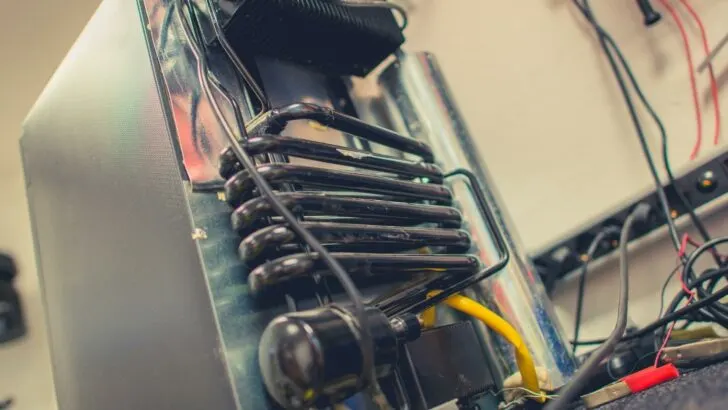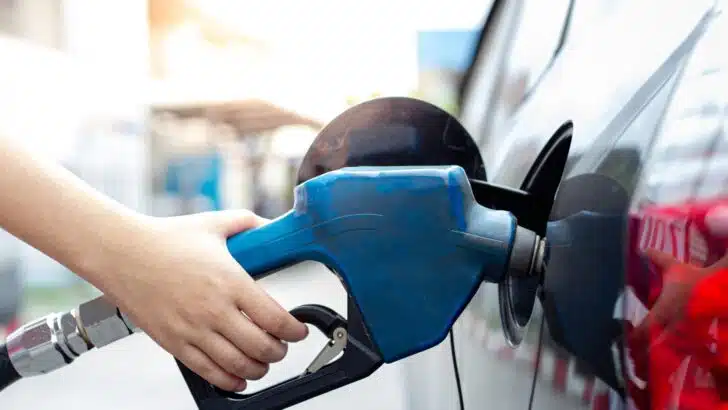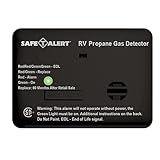“Can I run my RV refrigerator on propane while driving?” It’s a common question and certainly one worth asking. In this post, we’re looking at whether running an RV fridge on propane while driving is possible and, more importantly, if a fridge running on propane in a rig driving down the road is safe.
- 1) Do All Types of RV Fridges Run On Propane?
- 2) Can I Run My RV Refrigerator On Propane While Driving?
- 3) Is It Safe to Run My RV Refrigerator On Propane While Driving?
- 4) How to Minimize the Dangers of Running an RV Fridge In Propane Mode While Driving
- 5) Free RVing Tips, Tricks, Reviews & Giveaways
Do All Types of RV Fridges Run On Propane?
The answer to this question is no. Some types of refrigerators in RVs are capable of running on propane. Others, however, don’t have this capability.
For example, some RV fridges operate on 12V power or 120V power exclusively. 12V RV refrigerators and 120V RV residential refrigerators don’t offer the capability of running on propane at all.
However, absorption refrigerators are very common in RVs. These are typically two-way or three-way fridges.
A two-way absorption refrigerator can run on propane or 120V AC power. With this type of absorption fridge, if you’re connected to shore power you’ll run your refrigerator in AC power mode. When not connected to shore power, you’ll need to rely on propane mode to keep your fridge cool. You could also run a generator, but that isn’t practical for regular long-term use.
A three-way absorption refrigerator is capable of operating on propane, 120V AC power, or 12 volt DC power (as in battery power from your house battery bank or from your vehicle’s alternator).

If you have an absorption RV refrigerator, the back of the fridge is likely to look something like this.
Can I Run My RV Refrigerator On Propane While Driving?
Can RV owners run a propane refrigerator while their RV is rolling down the road? Technically yes, you can, in most situations. There used to be some states that restricted vehicles driving while propane is turned on (either your onboard tank or cylinders). However, with the advent of natural gas-powered vehicles, those restrictions have all but disappeared.
However, there are some restrictions still enforced on ferries and in tunnels, because of the added danger of fire in both situations. This is where something like the CoPilot RV GPS app comes in handy because it lets you know in advance when a propane-restricted tunnel is ahead, for example.
But the real question is whether or not you should run your propane fridge while your rig is driving down the road.
To operate in propane mode, not only must your propane be turned on, but you’ll also have a flame igniting the propane to keep the fridge cold. This is where the issue of the safety of driving an RV with propane on comes into question.
So let’s reframe the question and look at it from a safety perspective.
Is It Safe to Run My RV Refrigerator On Propane While Driving?
Let’s take a look at the safety considerations of driving an RV down the road with the fridge running in propane mode, and how we might minimize any risks that could arise as a result.
Gas Leak
One safety consideration is that having the propane turned on while driving opens the potential for a propane leak to develop as a result of vibration or rubbing that could result in a fire or explosion.
Wind Blowing the Flame
Another potential danger is that the wind and motion could cause a fire in the workings of the refrigerator. This is most likely to occur if the back of the refrigerator isn’t kept clean and free of debris.
However, it would be fairly easy for built-up debris to catch fire. So if the back of an RV refrigerator is dirty, there is much more likelihood of fire.
Explosion or Fire In An Accident
Another consideration is that if the propane is on and an accident occurs, it could result in a fire or explosion. There’s even some concern that a tire blowout could sever a propane line resulting in a leak that could ignite a fire or explosion.
When Refueling
Finally, running an RV fridge in propane mode while on the road can pose a risk at fueling stations. Here the danger lies in the potential for forgetting to turn the propane off before refueling your rig.

Turning off the propane on your RV during fueling will reduce the potential for fire or explosion, especially if you have a gas rig with the fuel fill near the fridge.
It’s important to remember that a propane fridge has an open flame. So when you’re at a gas station, it’s possible that fuel vapor could ignite from that flame behind your fridge. That’s especially true if your rig’s fuel fill is near the fridge.
How to Minimize the Dangers of Running an RV Fridge In Propane Mode While Driving
There are several ways to mitigate the potential for danger when running a propane fridge in an RV.
Turn Off the Propane
Obviously, the most effective way to reduce the potential for propane-related risks is to turn off the propane at the tank/cylinder(s) before driving your RV down the road. Obviously, going that route means that the fridge will be off during travel unless you have a 3-way fridge that can run off 12V DC.
Of course, you could run a generator to use the 120V AC side of the fridge while driving. That’s true for a residential-style fridge, too, although we always ran ours off our inverter, fed by our lithium battery bank and solar panels.
Fortunately, RV fridges are usually pretty well-insulated. Once they’re cooled down, they can be left off for hours — even overnight — without a large rise in temperature.
Following are several ways to keep your food and beverages cold while the propane and fridge are turned off during road trips.
- Pre-Cool the Fridge
Pre-cooling the refrigerator the night before you travel helps to thoroughly cool the fridge so that you can drive with the propane off, turning it back on when you reach your destination.
We know that making extra trips out to the RV can sometimes be a challenge for weekend warriors who have their RVs in storage, especially if it’s not near home. But pre-cooling the fridge… and the food that will go into it… really helps. That’s true even if you plan to leave the propane and fridge on while driving.
- Use Ice Packs
Another trick is to freeze plastic water bottles or ice packs before hitting the road and put them inside your RV fridge to keep it cool as you drive.
- Use a Small Cooler
If you’re on an extended trip and will be driving for a long time, consider using a small cooler with ice or ice packs for your food and beverages for the day. That way, you won’t need to open your RV fridge throughout the day, which would let warm air in and cool air out.
We even carry a 12-volt portable Dometic refrigerator in the back of our car. Not only will it come in super handy with our new towable for the reason mentioned above, but it’s already an awesome piece of gear during regular food shopping trips!
- ADVANCED COOLING TECHNOLOGY: Keep your food and drinks cold with the Dometic CFX3 Portable Refrigerator, which features powerful VMSO3 compressor...
- RUGGED AND VERSATILE DESIGN: The heavy-duty ExoFrame construction and aluminum alloy handles of the refrigerator ensure that it can stand up to any...
- Pack Your RV Fridge Well
Keeping your RV fridge well-stocked helps keep the contents cool for longer periods when the power to the fridge is turned off.
Note that all of the above tips will help you save on propane as well.
Use a Propane Detector and Propane Leak Tester
To address the risk of a potential gas leak, make sure your RV propane detector is up-to-date and working. Note that this is unlikely to be helpful if you’re towing a travel trailer, fifth wheel, or truck camper since you wouldn’t be likely to hear the propane detector going off while you’re driving.
We wrote a whole post about RV propane detectors and included our video where we showed in real time how to replace them (yes, they expire).
- Includes mounting bracket
- Power Supply and Current Draw: 12 vDC 75mA @ 12 vDC
You can also use a propane leak tester to see if there’s any propane leaking.
- 【Combustible Gas Leak Detector】The TopTes PT199 is suitable for LPG, methane, ethane, propane, butane, natural gas, coal gas, gas fuel, liquefied...
- 【Visual & Audio Gas Alarm】The gas detector employs both visual alarm and audible alarm as fast as 0.5 seconds of detection. When the bar graph...
Add a GasStop Safety Shutoff
Add a GasStop safety shutoff to your propane tank/cylinder. This is an inline propane gauge that also adds a shutoff when a leak is detected.
- 100% PROTECTION - GasStop is a must-have safety device that protects families with RVs that have propane systems on board. Its automatic emergency...
- CONVENIENT PRESSURE INDICATOR - Effortlessly monitor pressure levels in your propane tank to prevent gas runouts when you need it most – no...
You can also buy GasStop through TechnoRV. If you do, be sure to use the RVGEEKS coupon code to save 5%:
TechnoRV.com is a supplier of leading RV technology products that are designed to enhance your RV lifestyle. That includes items like LevelMatePRO, Viair portable air compressors, connectivity...Show More
TechnoRV.com is a supplier of leading RV technology products that are designed to enhance your RV lifestyle. That includes items like LevelMatePRO, Viair portable air compressors, connectivity equipment, and more!
Use the Promo Code "RVGEEKS" to save 5% on your entire order at TechnoRV.
Show LessKeep the Back of the Fridge Clean
This potential risk can be reduced by keeping the back of the fridge clean. Note that there’s some potential for this to be an issue in heavy winds while the RV is parked, too… if the back of the fridge isn’t well-maintained and kept clean.
Turn Off Propane At Fueling Stations
If you make it a habit to turn off your propane when refueling your rig, this will reduce or eliminate the potential for a fire or explosion. That open flame on the back of an RV fridge won’t mix well with gasoline vapors.
Many RVers run their RV refrigerators in propane mode while driving down the road all the time. We’ve done it ourselves. Many people have done it for years without encountering a single problem. But it’s certainly safer to keep the propane off while your rig is rolling down the road.
If you choose to leave the propane on while driving, be sure to take appropriate safety precautions and be mindful of any regulations and restrictions, particularly in tunnels and on ferries.
Free RVing Tips, Tricks, Reviews & Giveaways
As 20-year full-timers, we share everything we’ve learned about RVing over the years. Join our online community to receive a wealth of great RVing knowledge delivered daily to your inbox.
Whether you’re a new RVer or a seasoned full-timer, you’ll love the wide range of RVing topics we cover. Don’t miss a single article or any of our famous Giveaways. Subscribe to our newsletter today!







Pat
Tuesday 20th of February 2024
Interesting information we always drive with our propane off. Thanks for good info
Bill
Tuesday 20th of February 2024
Interesting that you don't mention anything about running a fridge on propane when the fridge is NOT level. I was always under the impression that running a fridge on propane it should be level. When driving roads that have a camper to them or in the mountains your fridge is going to be far from level and would shorten its life. Thanks for your great info you provide on this blog and YouTube.
TheRVgeeks
Tuesday 20th of February 2024
Hi Bill! Thank you so much for mentioning that. We may have been remiss in not mentioning that, but the reason is because, while RV absorption refrigerators do indeed need to be kept level to operate properly, the one exception to that happens to be while the RV is in motion. We had a considerable discussion about that very topic with factory reps from Norcold at an RV rally, and they told us that the movement of driving overcomes any off-level issues, and we shouldn’t be worried about it. But thank you again for mentioning that important related issue here!
AK FIsh
Tuesday 20th of February 2024
Per GasStop website: GasStop offers UP TO 19 feet of protection against major leaks (0.31″ hose/pipe diameter) with an outlet pressure of 87 to 116 psig from your cylinder.
I interpret that to read if you have propane appliances more than 19 feet away, this may not protect you against major leaks as much as you think it would. Only you can determine if your propane tanks are within this distance of any propane appliances.
TheRVgeeks
Tuesday 20th of February 2024
Thanks so much for the clarification and additional details.
Dale N
Tuesday 20th of February 2024
Aren't you referring to a propane 'cylinder' and not a propane tank when suggesting to turn it off when driving? The risk of explosion is much greater when fueling gasoline than diesel so some vehicles do not have the same risk
Stan Wieg
Tuesday 20th of February 2024
@TheRVgeeks, Our rig is a diesel, which is not as hazardous as gas. However, the guy at the next pump is probably pumping gas - and my pilot light is still lurking there waiting for the fumes.
TheRVgeeks
Tuesday 20th of February 2024
Hi Dale! We're actually referring to BOTH! As long-time owners of an RV with a large built-in propane tank, we do usually tend to use the word "tank" which is technically defined as "a receptacle or storage chamber, especially for liquid or gas." But we definitely know that "cylinder" is the common term for portable models, especially the very small type. Sorry for not including that term in the article, but we are indeed referring to any storage chamber for propane, either permanently mounted or portable, when we say that leaving the main valve on it open while driving isn't the safest practice. And you're absolutely right about gas being the big explosion danger, not diesel, which is why we mentioned "gasoline vapors" in section 5 as being the biggest risk when fueling up.